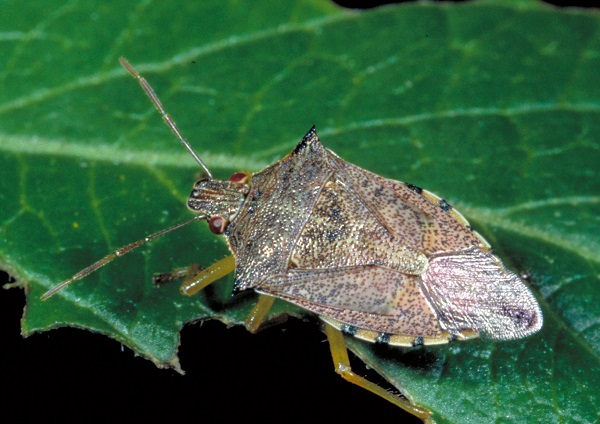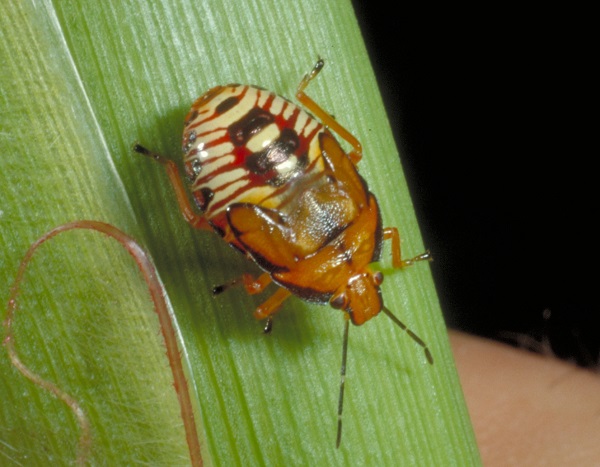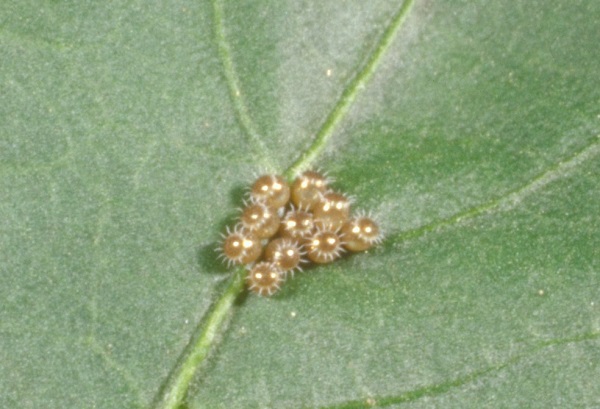Spined Soldier Bug in Kentucky
ENTFACT-325: SPINED SOLDIER BUG IN KENTUCKY | Download PDF
Chelsea Berish, Undergraduate Student
Stink bugs are common pests and can be difficult to manage in many cropping systems. Because of this, many people consider the entire group to be destructive. For example, the brown marmorated stink bug, an invasive pest, received considerable popular press coverage when it was introduced into Kentucky in 2010. While many stink bug species in Kentucky can cause significant damage to crops, some species are actually beneficial predators that feed on other insects. One of these beneficial species is the spined soldier bug. The spined soldier bug is a predatory stink bug that feeds on a wide variety of field and garden pests including Mexican bean beetle, Colorado potato beetle, and imported cabbageworm. Because it feeds on insect pests, it is called a ‘natural enemy’ of some insects. And because “the enemy of my enemy is my friend,” the spined soldier bug can be a valuable part of a crop system.

Figure 1. Spined soldier bugs can be recognized by their pointed 'shoulders' and dark marking on the transparent part of the front wings.
The spined soldier bug may not be the first insect we think of when considering biological control methods, but it can be purchased and released in home gardens, agricultural fields, and greenhouse operations to help control pest problems. More importantly, if noticed and properly recognized, spined soldier bug does not need to be removed or controlled like some other stink bug species that are pests.
The adult spined soldier bug is shield shaped and about 1.5 cm in length. Along the abdomen and beyond the edge of the wings is an alternating pattern of dark and light colored spots. This insect is also characterized by its mottled brown coloration and outward protruding spines located behind the head. It can be confused with the brown stink bug, which is a pest species, but the spined soldier bug has a dark marking on the transparent part of the wings that gives the appearance of a small tail.

Figure 2. The spined soldier bug nymph is often observed actively searching plants for prey.
There are 5 nymphal instars of the spined soldier bug. Development takes about 25 days, and there can be up to 3 generations in one year. Adults and instars 2, 3, 4, and 5 are known to feed on several types of moth and beetle larva with their piercing-sucking mouthparts. Nymphs look different in each instar. The first two instars are red and black, and differ only in size. The third instar has red, white, and orange markings on the abdomen. Wing pads are noticeable in the fourth instar, and the fifth instar has prominent wing pads with black, white, and red abdominal markings.
Eggs are unique in that they are metallic bronze and have what resembles spiked crowns. 20-30 eggs are deposited at a time in slightly oval clusters. Early instars are gregarious in nature. After emerging, they can be seen clustered around their egg masses as they ingest necessary bacterial symbionts associated with the eggs.
The spined soldier bug is often found on plants where prey insects are feeding. These include (but are not limited to) cruciferous, cucurbit, and solanaceous crops. When prey is scarce spined soilder bugs have been known to occasionally feed on plants, but the damage is never economically significant.
This insect is commercially available from retailers of biological control agents. It may not be cost-effective to purchase the spined soldier bug for use on large farms, but it can be a viable option for pest control in home gardens. The spined soldier bug is also extremely effective when used in enclosed greenhouses.

Figure 3. The eggs look different from other stink bug eggs in that each has a crown of spines.
Naturally-occurring populations of spined soldier bug should be conserved. This can be accomplished by learning to recognize all life stages and leaving them undisturbed. All beneficial insects—including the spined soldier bug—can be promoted by limiting the use of non-selective insecticides. Populations of spined soldier bug can also be encouraged by planting a variety of crops and flowers in your garden or field. Natural enemies rely on pests for food, so permitting low levels of less desirable insects can also promote the presence of beneficial insects.
Spined Soldier Bug Suppliers
- Biocontrol Network
5116 Williamsburg Rd.
Brentwood, TN 37027
(800) 441-2847
www.biconet.com - Green Methods
9664 Tanqueray Ct.
Redding, CA 96003
(800) 477-3715
www.greenmethods.com - Natural Insect Control
3737 Netherby Road
Stevensville Ontario LOS 1S0 Canada
(905) 382-2904
www.naturalinsectcontrol.com - Planet Natural
1612 Gold Avenue
Bozeman, MT 59715
(800) 289-6656
www.planetnatural.com - Rincon-Vitova Insectaries, Inc.
PO Box 1555
Ventura, CA 93002-1555
(800) 248-2847
www.rinconvitova.com
Revised: 11/19
